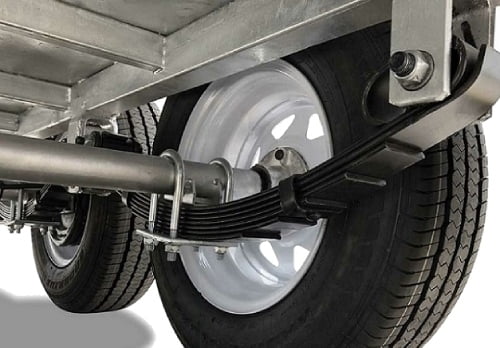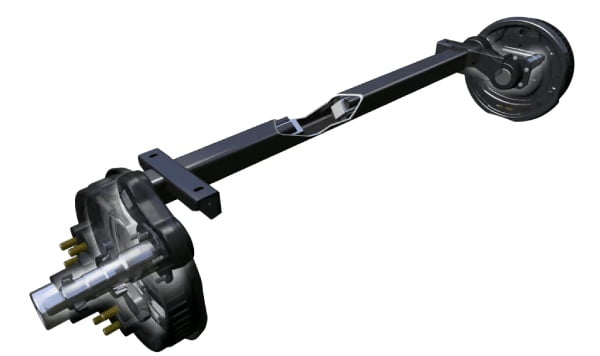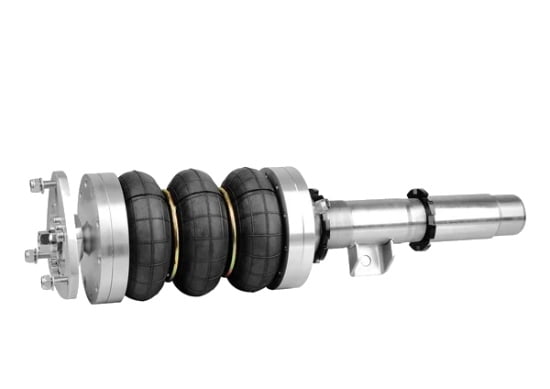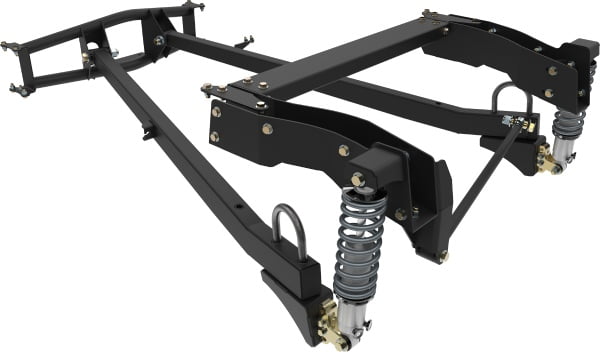When it comes to towing, the role of a well-functioning trailer suspension system is paramount. These systems, which come in various types, are the key to a smooth, safe, and efficient hauling experience. Whether you’re a seasoned hauler or a newcomer to the towing world, understanding the nuances of different trailer suspension types can empower you to make informed decisions about your equipment, enhancing your overall towing performance.
This comprehensive guide will explore the different trailer suspension types available today. From leaf spring suspensions to torsion axles, air ride systems to rubber suspensions, we’ll break down the pros and cons of each type. By the end of this article, you’ll have a solid grasp of how these suspension systems work and which one might be best suited for your specific towing needs.
So, buckle up and get ready to dive into the world of trailer suspension types. Your journey to smoother, safer hauling starts here!
Trailer Suspension Types:
When selecting the best suspension for your trailer, it’s crucial to consider the different trailer suspension types available today. Each suspension type is designed to meet specific needs, whether you’re looking for something that can handle heavy loads or rough terrains or provide a smooth ride. However, it’s not just about the type of suspension. Other factors, such as your towing frequency, the type of terrain you usually traverse, and your budget, also play a significant role in your decision. By understanding these considerations, you can make a confident and informed decision, ensuring the best performance, durability, and safety for your towing needs.
1. Leaf Spring Suspension
Overview: The leaf spring suspension is among the most traditional trailer suspension types. This tried-and-true system has been used for decades and remains famous for light and heavy-duty trailers. Its simple design is highly effective, especially for trailers that regularly haul significant weight. Leaf spring suspensions are among the most recognized and reliable trailer suspension types, known for their durability and ease of maintenance.

- Slipper Leaf Spring: A variation within the leaf spring category, slipper leaf springs are designed for heavy-load trailers. The spring’s rear end slides into a hanger, which allows greater flexibility and smoothness during travel. This makes slipper leaf springs ideal for trailers subjected to constant loading and unloading, as the system adjusts effortlessly to shifts in weight.
- Double-Eye Leaf Spring: Another key option within leaf spring trailer suspension types is the double-eye leaf spring, built for added stability. The “double eye” design refers to the spring’s eyelets at both ends, which are attached to the trailer frame using shackles. This configuration provides better shock absorption and a sturdier connection, making it ideal for trailers on uneven terrain.
How it works: Leaf springs comprise several layers of flexible metal strips, commonly called “leaves.” These leaves flex as the trailer moves, absorbing impacts and distributing weight evenly across the axle. This suspension type does not rely on complex components, which is why it’s one of the most durable trailer suspension types available today.
Advantages: Leaf spring suspensions are highly cost effective and simple to maintain. Replacement parts are widely available, and repairs are straightforward. These trailer suspension types are perfect for anyone needing to haul heavy loads, as they can handle significant weight without compromising safety. Their longevity and reliability also make them a trusted option for long-term use.
Disadvantages: Despite their strengths, leaf spring suspensions can deliver rougher rides than modern trailer suspensions. Since the system isn’t designed for flexibility in high-speed or off-road conditions, it may not offer the smoothest performance on uneven surfaces.
2. Torsion Axle Suspension
Overview: As one of the more advanced trailer suspension types, torsion axle suspensions significantly upgrade ride smoothness and performance. This suspension type has gained popularity due to its independent wheel movement, which allows each wheel to react individually to road conditions. It’s often seen in trailers that need more stability, especially on rough roads or during high-speed travel.

How it works: Unlike leaf spring suspensions, torsion axle systems use rubber cords that run through the axle tube. When the trailer encounters bumps or rough surfaces, these rubber cords compress and flex to absorb the shock. The result is a much smoother ride than traditional trailer suspension types, as the torsion system adjusts independently based on road conditions.
Advantages: One of the critical benefits of torsion axle suspensions is their ability to provide a quieter, smoother experience. The independent suspension also reduces stress on the trailer frame, prolonging the trailer’s life. Additionally, torsion axles require minimal maintenance compared to other trailer suspension types, as fewer mechanical parts are involved.
Disadvantages: Torsion axle suspensions offer many benefits but are generally more expensive upfront. Repairs can also be more complicated. If a torsion axle fails, you’ll often need to replace the entire assembly instead of just replacing individual components like in other trailer suspension types.
3. Air Suspension
Overview: Air suspension is among the most sophisticated trailer suspension types. Typically used in commercial or heavy-duty trailers, this system uses air-filled bags to cushion the load, providing superior comfort and performance. Air suspension is often the go-to choice for trailers carrying fragile cargo or navigating rough terrain, as it delivers the smoothest ride among all trailer suspension types.

How it works: This suspension system relies on airbags, which are inflated and deflated based on the trailer’s load and road conditions. These airbags absorb road impacts, making the trailer ride feel soft and controlled. Additionally, many air suspension systems have automated levelling features, which adjust the air pressure in real time to ensure the trailer stays level, even if the load shifts.
Advantages: The primary advantage of air suspension systems is their ability to provide a smooth ride quality, even when hauling heavy loads. These systems can be adjusted to handle various loads, making them one of the most adaptable and flexible trailer suspension types. This versatility is handy for trailers that frequently change cargo weights, allowing them to maintain optimal performance under varying conditions.
Disadvantages: While air suspension is effective, it comes with a higher cost for initial installation and ongoing maintenance. Regular checks are necessary to ensure the airbags are functioning correctly. If the system fails, it can lead to significant repair costs compared to other trailer suspension types.
4. Rubber Suspension
Overview: Rubber suspension is a relatively quiet and compact option among trailer suspension types, often chosen for smaller trailers or those where noise reduction is a priority. This system uses rubber components to absorb impacts, making it ideal for trailers that don’t carry extremely heavy loads but still need a reliable suspension.

How it works: In a rubber suspension system, the axle is fitted with rubber inserts that compress under pressure. This design eliminates the need for metal springs or air systems. As the trailer moves over uneven surfaces, the rubber compresses and decompresses, reducing the impact on the trailer and its cargo.
Advantages: Rubber suspensions are highly durable, and they need low maintenance. They are also resistant to rust and corrosion, which makes them a long-lasting option. This suspension type is also known for quietness, as the rubber material naturally absorbs noise and vibration.
Disadvantages: The main drawback of rubber suspension is its limited load capacity compared to other trailer suspension types. It could be better for heavy-duty or commercial trailers that carry large or uneven loads. However, rubber suspension provides a reliable, maintenance-free solution for lighter trailers.
5. Parabolic Spring Suspension
Overview: Parabolic spring suspension is a modern evolution of the traditional leaf spring system, offering a more flexible and lightweight alternative. Among the more recent trailer suspension types, this system has gained traction for providing a smoother ride without sacrificing durability.

How it works: Parabolic springs differ from conventional leaf springs in using fewer but thicker leaves. These leaves are parabolically tapered, giving them more flexibility while maintaining strength. As the trailer moves, the spring flexes and absorbs shocks, much like a standard leaf spring, but with greater efficiency.
Advantages: The parabolic spring suspension system is lighter than traditional leaf springs, making it more fuel-efficient. It also offers a smoother ride, as the springs flex more easily under pressure. This trailer suspension type is ideal for trailers balancing load-bearing capacity with ride comfort.
Disadvantages: Parabolic springs tend to be more expensive than traditional leaf springs. They are also less commonly available, making finding replacement parts more challenging than other trailer suspension types.
6. Trailing Arm Suspension
Overview: Trailing arm suspension is an advanced, independent suspension system perfect for off-road trailers or trailers that navigate rugged terrains. Among the more specialized trailer suspension types, trailing arm suspension offers superior handling and stability, especially in uneven conditions.

How it works: Each wheel in a trailing arm suspension system is attached to its suspension arm. These arms move independently, allowing the trailer to maintain stability even when one wheel encounters an obstacle. This independent movement makes trailing arm suspensions ideal for trailers in rugged or off-road environments.
Advantages: The independent nature of this trailer suspension type allows for superior ride comfort and handling. It’s highly adaptable, making it a favourite for trailers used in challenging environments. The design also reduces stress on the trailer frame and tyres, leading to better longevity.
Disadvantages: Trailing arm suspensions are complex systems generally more expensive than other trailer suspensions. They also require more maintenance due to the number of moving parts involved. While they are excellent for off-road use, they may need to be more balanced for trailers that primarily travel on highways or smooth roads.
Factors to Consider When Choosing Trailer Suspension
Choosing the right suspension for your trailer can significantly affect its performance and longevity. With so many trailer suspension types available, it’s essential to consider several key factors to find the best fit for your needs. Here’s what you should keep in mind:
1. Vehicle Type
First, consider the vehicle you’ll use to tow your trailer. Different trailer suspension types work better with various kinds of towing vehicles. For example, if you’re using a heavy-duty truck, you might need a more robust suspension like air suspension or trailing arm suspension to handle the load. On the other hand, if your towing vehicle is smaller, simpler systems like leaf springs or rubber suspensions might be just fine. Matching the right suspension type to your car ensures a smoother and safer towing experience.
2. Load Capacity
Next, consider how much weight you’ll be hauling. Not all trailer suspension types are created equal in terms of load capacity. If you frequently carry heavy loads, you’ll want a suspension that can handle that without compromising performance or safety. Air suspensions and parabolic springs are great for heavy-duty use. In contrast, leaf springs might be sufficient for lighter loads. Make sure the suspension you choose can support your typical load without straining.
3. Ride Comfort
Ride comfort is another crucial factor, especially if you do a lot of long-distance towing or travel over rough roads. Some trailer suspension types offer a much smoother ride than others. For instance, air suspension systems are known for their excellent comfort levels since they can adjust to different loads and road conditions. Torsion axles also provide a smoother ride compared to traditional leaf springs. Ride comfort is essential, and a suspension that meets those needs should be chosen.
4. Cost
Of course, budget is always a consideration. Some trailer suspension types are more affordable than others. Leaf springs, for example, are generally budget-friendly, whereas air suspensions or trailing arms can be pricier. Consider what you’re willing to spend and balance that against each suspension type’s benefits. Spending more upfront can save you money in the long run with lower maintenance costs and better performance.
5. Maintenance
Different trailer suspension types also come with varying maintenance requirements. Leaf springs are typically low-maintenance, while air suspensions might need more frequent checks and servicing. Rubber suspensions are easy to take care of, but torsion axles need specific attention to ensure they last. Consider how much time you will spend on maintenance and pick a suspension that fits your lifestyle.
Choosing the Right Suspension
To make the best choice, weigh all these factors carefully. Think about how each trailer suspension type stacks up against your vehicle, the loads you carry, your comfort preferences, your budget, and how much maintenance you’re prepared to do. By taking a comprehensive look at these aspects, you’ll be better equipped to choose a suspension that perfectly suits your trailer and towing conditions.
Conclusion
Choosing the right trailer suspension type is critical to ensuring your trailer handles well and suits your needs. Each type offers its benefits with options ranging from classic leaf springs to modern air suspensions.
When deciding, consider factors like your vehicle, the load you carry, ride comfort, budget, and maintenance. You’ll get a smoother ride, better performance, and potentially lower long-term costs
by matching the proper suspension to your requirements.
Take time to weigh these factors and choose a suspension that fits your trailer and towing conditions. A well-chosen suspension system can make a big difference in your towing experience, giving you comfort and reliability on the road.
If you want to know about top intreting websites to kill time, Click here:


